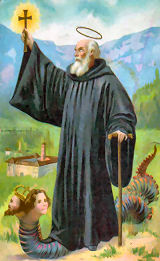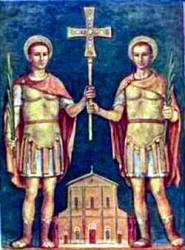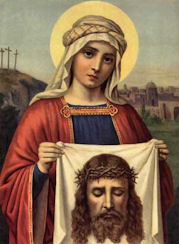
Daily Readings for:July 12, 2014
(Readings on USCCB website)
Collect: O God, who in the abasement of your Son have raised up a fallen world, fill your faithful with holy joy, for on those you have rescued from slavery to sin you bestow eternal gladness. Through our Lord Jesus Christ, your Son, who lives and reigns with you in the unity of the Holy Spirit, one God, for ever and ever.
RECIPES
ACTIVITIES
PRAYERS
o Novena to Our Lady of Mount Carmel
o St. Veronica Prayer to the Sacred Image of Jesus Christ
· Ordinary Time: July 12th
· Saturday of the Fourteenth Week of Ordinary Time
Old Calendar: St. John Gualbert, abbot; Sts. Nabor and Felix, martyrs; St. Veronica of the Veil (Hist)
According to the 1962 Missal of St. John XXIII the Extraordinary Form of the Roman Rite, today is the feast of St. John Gualbert, a native of Florence, Italy. One Good Friday, accompanied by armed servants, he met his brother's murderer, unarmed and alone; he was about to slay him when the murderer fell at his feet begging forgiveness for the love of Christ crucified. John was touched by grace, recalling our Lord's command to love one's enemies and embraced him as a brother.
Soon afterwards he became a monk, and founded the new order of Vallombrosa under the Rule of St. Benedict. At this period simony and clerical immorality were rife in Italy. By his firmness and preaching St. John Gualbert successfully opposed these grave disorders. He died in 1073, having paved the way for the Gregorian reform.
This is also the feast of Sts. Nabor and Felix, Roman martyrs whose bodies were taken from Rome to Milan. St. Ambrose preached their panegyric (a formal public speech delivered in high praise of a person, and generally high studied or undiscriminating eulogy) at the solemn translation of their relics.
Historically it is the feast of St. Veronica of the Veil, the woman of Jerusalem who wiped the face of Christ while He was on the way to Calvary.
St. John Gualbert
Our saint was born of a noble Florentine family about the year 995. His father was arranging for him to become a soldier when Hugo, the only other child, was murdered by a relative. It was Good Friday, and Gualbert, accompanied by an armed escort, met the murderer in a narrow pass. There was no way to avoid one another. They met, and the murderer, with arms crossed on his breast, threw himself at Gualbert's feet. Moved by his plea for mercy and the remembrance of Christ's dying act of forgiveness, he spared the murderer's life and lifted him up as a brother.
Gualbert continued his journey. Arriving at the Church of St. Minias, he prayed before a picture of the Crucified which appeared to move its head toward him. Thereupon he determined to dedicate his life to God in spite of his father's opposition. He cut off his hair, took the habit of a monk, and in a short time attained such perfection that his life and work were a model for others. He became the founder of the Vallombrosian monks, a branch of the Benedictine family.
Excerpted from The Church's Year of Grace, Pius Parsch
Patron: forest workers; foresters; park services; parks.
Symbols: Tau staff; crucifix; church in his hand; devil under his feet.
Things to Do:
- The life of St. John Gualbert offers a vivid and unusual example of heroic love of enemy. Let us seriously examine our conscience on this point. Let us recall that the Church places the kiss of peace before holy Communion; it is her way of teaching us that the Prince of Peace cannot come to our heart unless we are at peace with our fellowmen. Love of enemy is our Offertory gift; it is also the divine Gift received in return.
- Visit this website for more details about St. John Gualbert.
Sts. Nabor and Felix
The holy martyrs, Nabor and Felix, suffered in the persecution of Maximian. "They were Christian soldiers in the army of Emperor Maximian Hercules. Because of their Christian faith they were tried in Milan and beheaded in Lodi, Italy, (303 or 304). Their bodies were interred in Milan" (Martyrology). When Emperor Frederic Barbarossa captured Milan in the twelfth century, he gave the sacred relics to Reinald, archbishop of Cologne. Soon after, Reinald transferred the bodies of the holy martyrs to his episcopal see, where they are still venerated in one of the cathedral's magnificent chapels.
Excerpted from The Church's Year of Grace, Pius Parsch
Symbols: Armour; in secular or classical costumes.
St. Veronica
According to Tradition, when St. Veronica saw Jesus fall beneath the weight of the cross He carried to his pending crucifixion, she was so moved with pity she pushed through the crowd past the Roman Soldiers to reach Jesus. She used her veil to wipe the blood and sweat from His face. The soldiers forced her away from Jesus even as He peered at her with gratitude. She bundled her veil and did not look at it again until she returned home. When she finally unfolded the veil--history does not clarify exactly what kind of material the veil was made from--it was imprinted with an image of Christ's face.
Some stories have alluded to St. Veronica being present at the beheading of St. John the Baptist. Others claim Veronica (Bernice) was a woman whom Jesus cured from a blood issue before His arrest in Jerusalem.
There is no reference to the biography of St. Veronica in the canonical Gospels. Her act of kindness and charity is represented in the Sixth of the Fourteen Stations of the Cross.
St. Veronica is believed to be buried in the tomb in Soulac or in the church of St. Seurin at Bordeaux, France. Her veil (the Veronica) is kept at St. Peter's Basilica in the Vatican at Rome.
Things to Do:
- Visit this website for more about St. Veronica.


